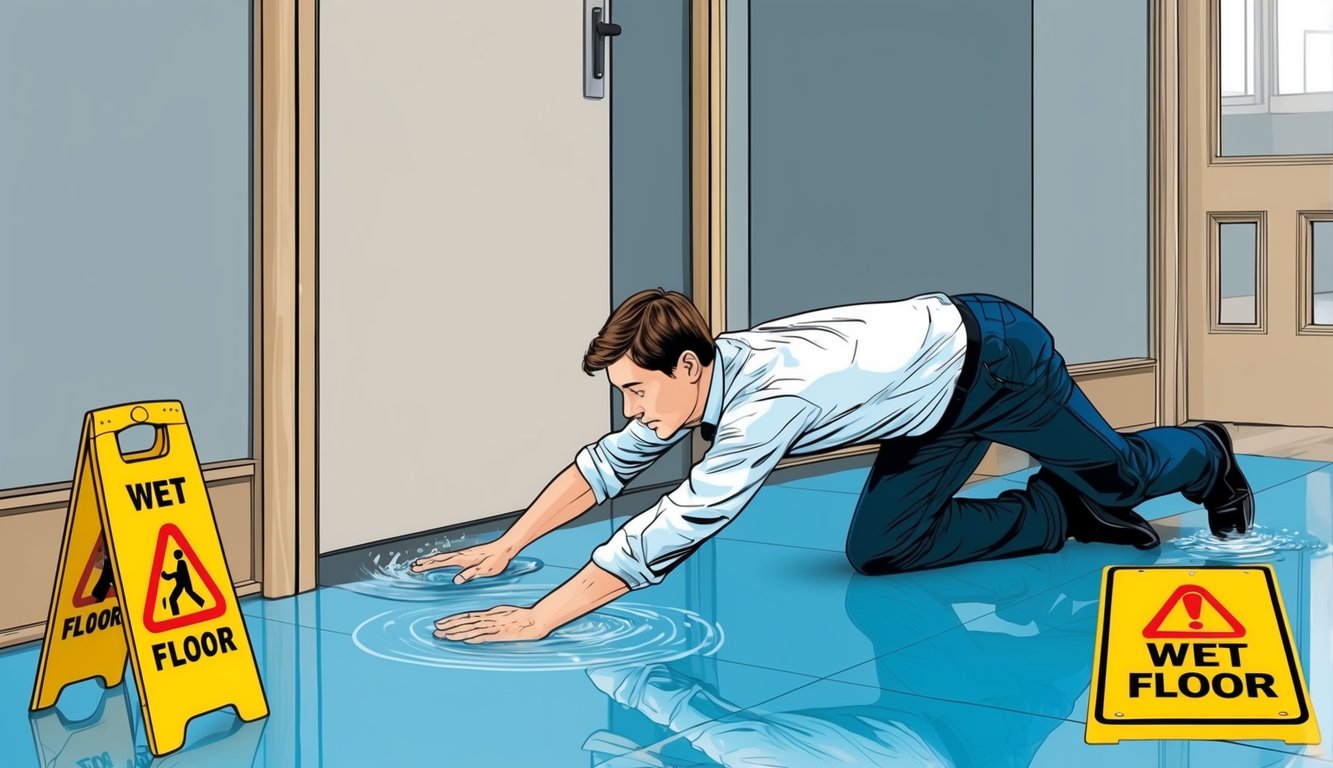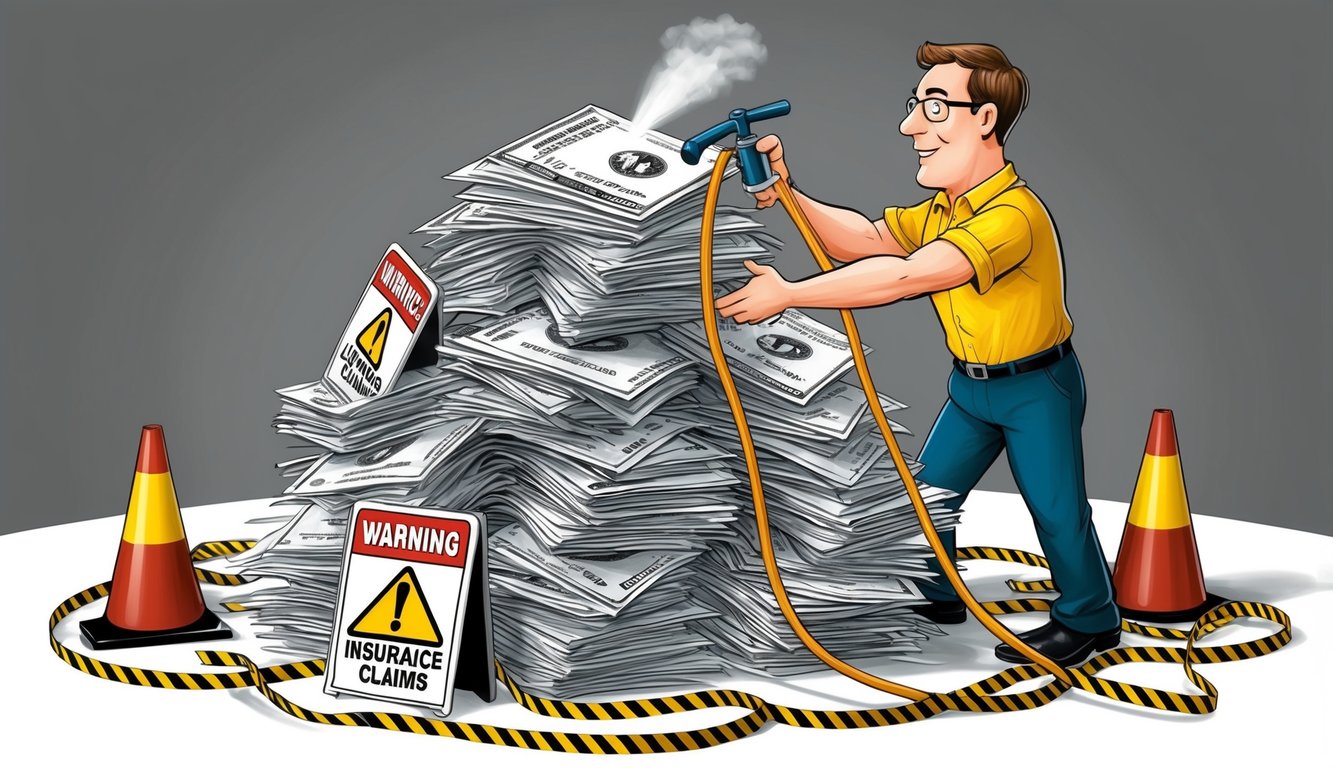Insurance scams can catch even the most vigilant consumers off guard.
These deceptive practices target unsuspecting individuals, potentially leaving them with financial losses and legal troubles. By familiarizing yourself with common insurance scams, you can better protect your assets and peace of mind.
Fraudsters constantly develop new tactics to exploit vulnerabilities in the insurance system.
From staged accidents to fake policy sales, these schemes come in various forms.
Staying informed about these scams empowers you to recognize red flags and take appropriate action when faced with suspicious situations.
1) Fake Accident Claims

Scammers stage accidents to file false claims and collect insurance payouts. Staged accidents can take many forms.
A driver might suddenly brake in front of you, causing a rear-end collision.
Or they may wave you into traffic, then crash into you deliberately.
Some scammers work in groups, with multiple vehicles involved in elaborate setups.
They may even have fake witnesses ready to support their version of events.
To protect yourself, always maintain a safe following distance when driving.
Be cautious of drivers behaving erratically or suspiciously.
Consider installing a dashboard camera in your vehicle.
This can provide crucial evidence if you’re involved in a staged accident.
If you’re in an accident, document everything thoroughly.
Take photos of the damage and scene.
Get contact information from all parties and witnesses.
Be wary if the other driver insists on using a specific repair shop or medical provider.
This could be part of the scam.
Report any suspicious accidents to your insurance company and local law enforcement. Insurance companies use sophisticated methods to detect fraudulent claims, but your vigilance is also important.
Stay alert and trust your instincts.
If something about an accident feels off, it probably is.
2) Ghost Brokers
Ghost brokers are fraudsters who pose as legitimate insurance agents to sell fake or invalid policies.
They often target unsuspecting consumers with promises of unusually cheap insurance deals.
These scammers typically operate through social media platforms or messaging apps, advertising attractive rates that seem too good to be true.
Unfortunately, they often are.
Ghost brokers may use various tactics to create the illusion of genuine coverage.
They might forge documents, manipulate existing policies, or even purchase real policies using false information.
If you fall victim to a ghost broker, you could find yourself driving without real insurance, even if you believe you’re covered.
This can lead to serious consequences, including fines, points on your driving record, and potential legal issues.
To protect yourself, always verify the legitimacy of an insurance provider before purchasing a policy.
Check if they’re licensed with your state’s insurance department and look for official contact information.
Be wary of deals that seem significantly cheaper than quotes from well-known insurers.
If the price seems too good to be true, it likely is.
If you suspect you’ve encountered a ghost broker or have been sold a fraudulent policy, report it immediately to your local authorities and the Insurance Fraud Bureau.
Remember, legitimate insurance companies won’t pressure you into quick decisions or ask for payments through unusual methods.
Take your time to research and make informed choices about your insurance coverage.
3) Fraudulent Death Claims
Fraudulent death claims occur when someone falsely reports a person’s death to collect life insurance money.
This scam can take various forms, from faking one’s own death to reporting a living person as deceased.
Insurance companies are increasingly vigilant about these schemes.
They often employ investigators to verify death claims, especially for large policies or suspicious circumstances.
To protect yourself, be cautious about sharing personal information or policy details. Review your policy annually to ensure no unauthorized changes have been made.
If you’re a beneficiary, be wary of unexpected policy payouts.
Verify the death through official channels before proceeding with a claim.
Insurance companies may request additional documentation or conduct interviews to validate claims.
Cooperate fully with these processes, as they help prevent fraud and ensure legitimate claims are paid promptly.
Be alert to any unusual activity related to your policy.
If you receive correspondence about a claim you didn’t file, contact your insurance provider immediately.
Report suspected fraud to your insurance company and local law enforcement.
Many states have dedicated insurance fraud units to investigate these crimes.
4) Staged Home Theft

Staged home theft is a deceptive insurance scam where homeowners falsely report a burglary to claim insurance money.
Perpetrators often remove valuable items from their homes and hide them elsewhere before filing a police report.
To make the theft appear genuine, scammers may damage doors or windows to simulate a break-in.
They might also provide a list of stolen items, including expensive electronics, jewelry, or artwork that they never actually owned.
Insurance companies are becoming increasingly aware of this fraudulent activity.
They now employ sophisticated methods to detect suspicious claims and investigate reported thefts more thoroughly.
To protect yourself from being falsely accused of staging a home theft, take preventive measures.
Document your valuable possessions by keeping receipts, taking photographs, and creating a detailed inventory.
If you experience a genuine theft, report it to the police immediately.
Provide your insurance company with a copy of the police report and any evidence you have of the stolen items.
Be cautious of insurance agents or adjusters who pressure you to inflate your claim or add items that weren’t actually stolen.
Such behavior could be a red flag for potential fraud.
Remember, participating in staged home theft is illegal and can result in severe consequences, including criminal charges and policy cancellation.
Always be honest when filing insurance claims to avoid legal troubles and maintain your coverage.
5) Vehicle Dumping

Vehicle dumping is a deceptive practice where car owners deliberately abandon or destroy their vehicles to claim insurance money.
This scam often involves staging accidents or reporting vehicles as stolen.
Scammers may sink their cars in lakes, push them off cliffs, or leave them in high-crime areas hoping they’ll be stolen or vandalized.
They then report the vehicle as missing or damaged to collect insurance payouts.
To protect yourself from being falsely accused of vehicle dumping, always report accidents promptly and keep detailed records of your vehicle’s condition and location.
Take regular photos of your car and its surroundings.
If you’re buying a used car, be wary of vehicles with suspicious damage or unclear histories.
Request a comprehensive vehicle history report to check for previous insurance claims or reported thefts.
Insurance companies are increasingly using advanced forensic techniques to detect vehicle dumping fraud.
They may investigate the scene, analyze damage patterns, or use data from onboard computers to verify claims.
If you witness suspicious activity that could be vehicle dumping, report it to local law enforcement or your insurance company’s fraud hotline.
Your vigilance can help combat this type of insurance fraud and keep premiums lower for everyone.
6) Non-existent Repairs
Non-existent repairs scams occur when dishonest repair shops or individuals claim to have performed work on your vehicle or property that never actually took place.
This type of fraud can cost you money for services you didn’t receive and potentially leave your property in an unsafe condition.
To protect yourself from this scam, always request detailed invoices for any repair work.
These should include itemized lists of parts replaced and labor performed.
Be wary of vague descriptions or unusually low prices for complex repairs.
Consider getting a second opinion from another repair shop if you’re unsure about the legitimacy of proposed repairs.
This can help you verify if the work is necessary and reasonably priced.
When dealing with auto repairs, take photos of your vehicle before and after service.
This can provide evidence if you suspect fraud later.
For home repairs, ask for progress photos or conduct site visits during the repair process.
Be cautious of repair shops that pressure you to pay in cash or make immediate decisions.
Reputable businesses should be willing to provide written estimates and allow you time to consider your options.
If you suspect you’ve been a victim of a non-existent repairs scam, report it to your insurance company and local law enforcement.
Keep all documentation related to the alleged repairs as evidence.
7) Rental Car Scams
Rental car scams can catch unsuspecting travelers off guard.
Be aware of fake rental car company websites that ask for prepayment with gift cards or prepaid debit cards.
Legitimate companies rarely request these payment methods.
When booking, carefully review all charges.
Some unscrupulous companies may add hidden fees or mandatory insurance.
Always read the fine print and ask for a breakdown of all costs before agreeing to rent.
Before driving off, thoroughly inspect the vehicle. Take photos or videos of any existing damage.
This documentation can protect you from false damage claims when you return the car.
Be cautious of rental agents pressuring you to upgrade or purchase additional services.
These may be unnecessary and inflated in price.
Research what insurance coverage you already have through your personal auto policy or credit card before accepting extra insurance.
If renting abroad, familiarize yourself with local traffic laws and rental practices.
Some scammers may try to exploit tourists’ lack of knowledge about regional regulations.
Always book through reputable companies and check reviews from multiple sources.
If a deal seems too good to be true, it probably is.
Trust your instincts and don’t be afraid to walk away if something feels off.
8) Faked Injury

Faked injury claims are a common insurance scam that can cost insurers millions of dollars annually.
Scammers may exaggerate or entirely fabricate injuries after an accident to receive larger payouts.
Be wary of individuals who claim severe injuries but show no visible signs of distress. Fake injury claims often involve soft tissue damages that are difficult to disprove, such as whiplash or back pain.
Watch out for people who seek medical treatment long after the incident or visit multiple doctors for the same injury.
These behaviors may indicate an attempt to build a false medical record.
To protect yourself, document everything at the accident scene.
Take photos, gather witness information, and call the police to file an official report.
Consider installing a dashcam in your vehicle.
It can provide valuable evidence to counter fraudulent claims and prove what really happened during an incident.
If you suspect someone is faking an injury, report your concerns to your insurance company immediately.
They have experienced investigators who can look into suspicious claims.
Remember, legitimate injuries do occur, so approach the situation with caution.
Your goal is to protect yourself from fraud while ensuring genuine victims receive the care they need.
9) Inflated Damage Claims

Inflated damage claims occur when individuals exaggerate the extent of damage to their property or vehicle after an accident or incident.
This type of fraud aims to receive a larger insurance payout than warranted.
You might encounter this scam in various scenarios.
For example, a dishonest mechanic may overstate the necessary repairs following a car accident.
They could claim additional parts need replacement or inflate labor costs.
Another common tactic involves adding pre-existing damage to the claim.
Unscrupulous individuals might include unrelated dents or scratches in their report to increase the payout.
To protect yourself, document the damage immediately after an incident.
Take photos and videos from multiple angles.
This evidence can help dispute any inflated claims later.
Get multiple repair estimates from reputable shops.
Compare these quotes to identify any outliers that might be inflating costs.
Review your insurance claim carefully before submitting.
Ensure all listed damages accurately reflect the incident.
Question any repairs or costs that seem excessive or unrelated.
If you suspect fraud, report it to your insurance company.
Many insurers have dedicated fraud investigation units.
You can also contact the National Insurance Crime Bureau to report suspected insurance fraud.
Stay vigilant and informed to protect yourself from inflated damage claims.
Your proactive approach can help maintain fair insurance practices and keep premiums reasonable for everyone.
10) False Health History

Providing false health information when applying for insurance is a serious form of fraud.
Some applicants may be tempted to omit or misrepresent medical conditions to secure lower premiums or coverage they might otherwise be denied.
This deception can include failing to disclose pre-existing conditions, lying about smoking habits, or understating alcohol consumption.
You might think these white lies are harmless, but they can have severe consequences.
Insurance companies rely on accurate health information to assess risk and set appropriate premiums.
If you’re caught providing false information, your policy could be canceled, leaving you without coverage when you need it most.
In some cases, falsifying health information may lead to legal repercussions, including fines or criminal charges.
It’s crucial to be honest and thorough when filling out insurance applications.
To protect yourself, always review your medical records before applying for insurance.
If you’re unsure about any aspect of your health history, consult with your doctor to ensure accuracy.
Remember, insurance is meant to provide financial protection in times of need.
Being truthful on your application ensures you have the right coverage and peace of mind.
If you suspect someone is committing insurance fraud by providing false health information, report it to the insurance company or your state’s insurance fraud bureau.
Your actions can help maintain fair premiums for all policyholders.
Steps to Take if You Suspect Fraud
If you believe you’ve encountered an insurance scam, act quickly. Report the incident to your state’s insurance fraud bureau and the National Insurance Crime Bureau.
Document all communication with the suspected scammer.
This includes emails, phone calls, and text messages.
This evidence can be crucial for investigations.
Contact your bank or credit card company immediately if you’ve made any payments.
They may be able to stop or reverse the transaction.
Consider placing a fraud alert on your credit reports to prevent identity theft.
You can do this for free through any of the three major credit bureaus.
Don’t engage further with the suspected scammer.
Block their number and email address to prevent additional contact.






